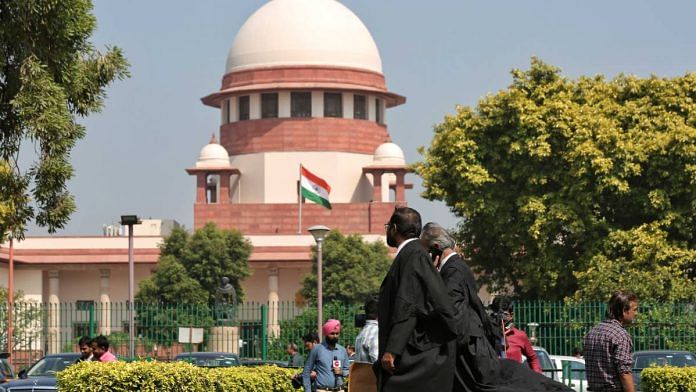New Delhi: “Bail is a rule and jail an exception” principle will not apply in Unlawful Activities (Prevention) Act (UAPA) cases, the Supreme Court held Thursday.
In a significant ruling, a bench of justices M.M. Sundresh and Aravind Kumar also declared that “bail must be rejected as a rule” should apply in UAPA cases unless the accused is able to prove his innocence to the prima facie satisfaction of the court.
Furthermore, it added that mere delay in trial of a UAPA case is no ground to grant bail in grave offences under the anti-terror law, while refusing to extend the benefit of a 2021 SC judgment, which said bail can be given in UAPA case in an exceptional circumstances where trial is delayed.
The top court’s decision came on an appeal filed by Gurwinder Singh, alleged to be part of proscribed terrorist group that included Canada-based Gurpatwant Singh Pannun, who was recently at the centre of a controversy that triggered a diplomatic recrimination between India and Canada.
“The conventional idea in bail jurisprudence vis-à-vis ordinary penal offences that the discretion of Courts must tilt in favour of the oft-quoted phrase — ‘bail is the rule, jail is the exception’ unless circumstances justify otherwise — does not find any place while dealing with bail applications under UAP Act. The ‘exercise’ of the general power to grant bail under the UAP Act is severely restrictive in scope,” the judgment said.
Singh had filed the present appeal seeking bail after the same was rejected by a Special NIA Court and also the Punjab and Haryana High Court. Both concluded there was prima facie material warranting his imprisonment pending the trial.
Apart from UAPA offences, Singh is also facing IPC Sections such as 124A (Sedition), 153A (promoting enmity between different groups etc), 153B (carrying arms), 120-B (criminal conspiracy).
‘Charges in present case reveals involvement of terrorist gang’
The prosecution arrested Singh, the accused, on 19 October, 2018, along with others for hanging cloth banners on which “Khalistan Jindabad” and “Khalistan Referendum 2020” was written, at Pillars Kot Mit Singh Flyover, Amritsar, on behalf of a banned terrorist module “Sikh for Justice.”
It was alleged that Singh and others received funds through illegal hawala transactions to spread terror in the country for furthering the cause of a separate Khalistan State.
Singh had pleaded that he was innocent before SC and said there was no incriminating material against him. Another plea raised by Singh was that of protracted trial in his case. He drew support from a 2021 SC judgement in the KA Najeeb case, which held bail can be granted to a UAPA accused if there is delay in the trial of his case.
The bench rejected Singh’s contention on delayed trial and distinguished it from Najeeb’s case.
In that matter, the bench said, the court’s decision to consider bail was grounded in the anticipation of the impending sentence the accused would have faced upon his conviction. Najeeb’s trial, the bench said, had been severed from that of his co-accused. This was because he was absconding and was arrested after the other accused in the case had been sentenced to eight years of jail. As he had remained in jail for five years and a list of prosecution witnesses were left to be examined, the court preferred to grant him bail, considering he had spent more than half of the sentence that was handed out to his co-accused.
In Singh’s case the trial is already under way and 22 witnesses including the protected witnesses have been examined.
In an analysis of the bail provision in UAPA law, the bench said the “language of bail limitation adopted therein remains unique” to the law.
Bail must be rejected as a ‘rule’, if after hearing the public prosecutor and after perusing the final report or Case Diary, the Court arrives at a conclusion that there are reasonable grounds for believing that the accusations are prima facie true, the bench said.
“In dealing with bail applications under the UAP Act, the courts are merely examining if there is justification to reject bail. The ‘justifications’ must be searched from the case diary and the final report submitted before the Special Court,” it said.
The apex court noted that this position is made clear by Sub-section (6) of Section 43D, which lays down that the restrictions, on granting of bail specified in Sub-section (5), are in addition to the restrictions under the Code of Criminal Procedure or any other law for the time being in force on grant of bail.
“It is pertinent to mention that the charges in the present case reveals the involvement of a terrorist gang which includes different members recruited for multiple roles. Hence, the mere fact that the accused has not received any funds or nothing incriminating was recovered from his mobile phone does not absolve him of his role in the instant crime,” the court said.
Taking Singh’s background into account, the bench said in such a scenario if the appellant is released on bail there is every likelihood that he will influence the key witnesses of the case which might hamper the process of justice.
(Edited by Zinnia Ray Chaudhuri)
Also read: ‘UAPA arrest without legal justification violates rights’ — HC on granting bail to J&K journalist



